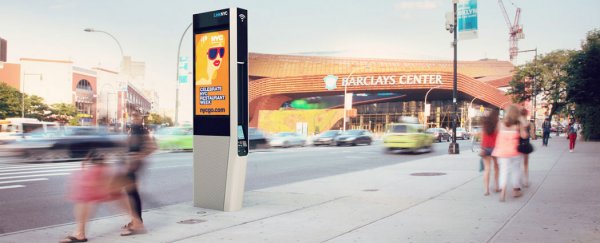You're probably used to getting Wi-Fi (of varying quality) in hotels, libraries and at home, but if Google gets its way, our city streets are going to be lined with ubiquitous wireless Internet access too. It's one of the company's visionary 'moonshots' - the name given to ambitious projects like its self-driving car fleet or delivering Web access via hot air balloon - and it just might work.
The project is all part of the new Sidewalk Labs startup Google has formed to bring the latest technology to the infrastructure of our cities. In the words of Google itself, the company has a mission to "improve life in cities for everyone through the application of technology to solve urban problems", with one of those problems being slow and potentially expensive data connections.
The new venture is called Intersection and it's based on Sidewalk Labs' acquisition of LinkNYC, which had previously been working to provide Wi-Fi to New York City. Google is looking at using all kinds of existing street furniture, from bus stops to pay phones, to enable the roll-out of city-wide wireless Internet for anyone to take advantage of.
"The vision really is to make cities connected places where you can walk down any street and have access to free ultra high-speed Wi-Fi," Sidewalk Labs chief Dan Doctoroff said in an interview with Wired. "The possibilities from there are just endless."
At first blush, widespread Wi-Fi seems like an unnecessary luxury - do you really need to check Facebook while walking down the pavement? - but public Internet access is growing ever-more crucial for education, healthcare and all kinds of other purposes. While many take it for granted, 55 million people in the US still don't have access to high-speed broadband.
And that's where Sidewalk Labs comes in. The startup is ready to provide bespoke systems and layouts based on the particular setup of each city, where necessary: "The thing about cities is no two are the same," explains Colin O'Donnell, founding partner of one of the companies acquired by Sidewalk Labs. "Maybe we're replacing a phone booth in New York, but it might be adding services to a bus shelter in Philadelphia or a bike share in San Francisco."
It may be some time before cities outside of New York get the benefits of this type of technology (it is a moonshot after all), but widespread Internet access is in Google's interest - more people online means more people using its services. So far, the company hasn't revealed any information about cities beyond New York.
It's also a boon for local authorities too, who can use the blanket Wi-Fi to track services and people across the urban landscape. For example, beaming back live video feeds from dozens of fire trucks is a lot easier when there's a high-speed Wi-Fi receiver in every lamppost. In a few short years you might never be without a super-fast Internet connection.
